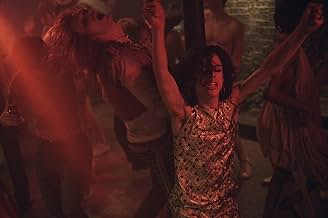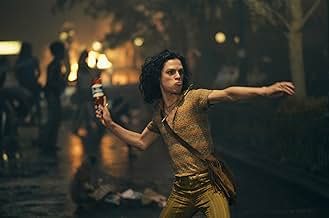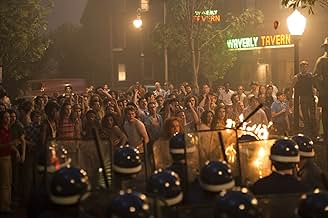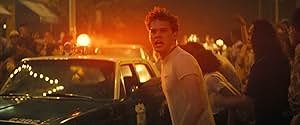NOTE IMDb
5,4/10
4,7 k
MA NOTE
L'éveil politique d'un jeune homme et son passage à l'âge adulte au cours des jours et des semaines qui ont précédé les émeutes de Stonewall.L'éveil politique d'un jeune homme et son passage à l'âge adulte au cours des jours et des semaines qui ont précédé les émeutes de Stonewall.L'éveil politique d'un jeune homme et son passage à l'âge adulte au cours des jours et des semaines qui ont précédé les émeutes de Stonewall.
- Réalisation
- Scénario
- Casting principal
- Récompenses
- 4 nominations au total
Vlad Alexis
- Cong
- (as Vladimir Alexis)
Avis à la une
Gay themed films are n abundance right now and (lesbian couples, transgender stories, more gay characters in many films) so it seems only natural that yet another film be made about the beginning of gay rights in the US. STONEWALL does that and despite the emphasis on political corruption attempting to steal the thunder from the brave gays who initiated the change to Gay Pride it works for the most part.
Many viewers will avoid the film because of the depiction of gays as being homeless, feminine street hustlers – too much so that it becomes a distraction form the other aspects of the story – but at least the message and the dates and the history are there. The plot revolves around the 1969 Stonewall Riots, the violent clash that kicked off the gay rights movement in New York City. The drama centers on Danny Winters (Jeremy Irvine), who flees to New York after an aborted coming out with Joe (Karl Glusman) and being ousted by his homophobic father (David Cubitt), leaving behind his sister Phoebe (Joey King). He finds his way to the Stonewall Inn, where he meets Trevor (Jonathan Rhys Meyers) before catching the eye of Ed Murphy (Ron Perlman), manager of the Stonewall who colludes with corrupt police and exploits homeless youth. Danny becomes close to a group of Nellie hustlers – especially Ray (Jonny Beauchamp) – and it is his association with this gay element that he eventually joins and fights for gay rights.
The cast is strong, the script by Jon Robin Baitz is less than impressive, but director Roland Emmerich manages to make the blend of history and human tragedy credible. Not a great movie, but the intentions are worthy.
Many viewers will avoid the film because of the depiction of gays as being homeless, feminine street hustlers – too much so that it becomes a distraction form the other aspects of the story – but at least the message and the dates and the history are there. The plot revolves around the 1969 Stonewall Riots, the violent clash that kicked off the gay rights movement in New York City. The drama centers on Danny Winters (Jeremy Irvine), who flees to New York after an aborted coming out with Joe (Karl Glusman) and being ousted by his homophobic father (David Cubitt), leaving behind his sister Phoebe (Joey King). He finds his way to the Stonewall Inn, where he meets Trevor (Jonathan Rhys Meyers) before catching the eye of Ed Murphy (Ron Perlman), manager of the Stonewall who colludes with corrupt police and exploits homeless youth. Danny becomes close to a group of Nellie hustlers – especially Ray (Jonny Beauchamp) – and it is his association with this gay element that he eventually joins and fights for gay rights.
The cast is strong, the script by Jon Robin Baitz is less than impressive, but director Roland Emmerich manages to make the blend of history and human tragedy credible. Not a great movie, but the intentions are worthy.
Greetings again from the darkness. Dramatized versions of real life events are always a bit tricky, and hindsight often proves it's best left to the documentary format. However, sometimes, a dramatized version helps us more easily relate to, and empathize with, those who were involved. That seems to be the approach taken by director Roland Emmerich in his re-telling of events so important to him and the LGBT movement
the Stonewall Riots of 1969.
The Stonewall Riots of June 1969 are often cited as the beginning of the Gay Liberation movement. Of course, there had been many previous clashes between gays and police, as discrimination was so extreme that these folks were labeled as mentally ill, and it was actually unlawful for gays to be hired for many jobs. On the streets of many big cities there existed a melting pot of minorities and the LGBT community. Many were young and homeless, and did whatever necessary to survive. So how best to tell this story? Director Emmerich and writer Jon Robin Baitz put blonde, white, Midwestern, pretty boy Danny (Jeremy Irvine, War Horse) front and center. How insulting to those involved.
To his credit, Emmerich does cast actors of various races to many roles, and he does seem to treat this as a sincere tribute or homage to those street kids who finally pushed back. Unfortunately, it's these characters that seem to be the drag on the story. Despite such names as Queen Cong, Little Orphan Annie, Quiet Paul, and the inclusion of real life activists as Marsha P Johnson (Otoja Abit), Bob Kohler (Patrick Garrow) and other key players like Ed Murphy (Ron Perlman) and Deputy Seymour Pine (Matt Craven) the film comes off more like a staged musical sans music. The closest thing to a real character is Ray, played with aplomb by Jonny Beauchamp ("Penny Dreadful").
Having the Columbia University-bound pretty white boy as the focus might make it easier for mainstream audiences to connect, but it skims over the real struggles going on at the time. We see Danny at home with his worried mother, observant little sister (Joey King), and macho football coach/father (David Gubitt). Everyone is uncomfortable over what is not being said, and the breaking point occurs when a tryst with the star quarterback becomes public knowledge. Just like that, Danny is booted from home (Indiana, not Kansas) and lands on the streets of New York. The comparisons to Dorothy (gay icon Judy Garland) and the Land of Oz are obvious, and repeated numerous times for those a bit slow on the take.
Christopher Street and the Stonewall Inn are the main settings. The mob involvement is noted, as is the desperation of the community, the use of flop houses, and the long-standing "quiet" demonstrations. Even the practice of gays trying to "fit in" to society – to prove they belong – by wearing suits and acting "normal" is addressed. The riots are reduced to a single evening in the movie, and of course, the pretty white boy gets to toss the first brick. As a 'roots of the movement' film, it's hard to believe this film won't create more anger and frustration than thanks and awareness. Fortunately, there are many exceptional books and yes, documentaries that provide a better perspective on the events that occurred more than 45 years ago. We do see the first Gay Liberation Parade held the following year in honor of the riots – a tradition that continues today. The closing credit sequence catches us up on the key activists, and even provides a startling statistic: 40% of today's homeless youth are LGBT.
The Stonewall Riots of June 1969 are often cited as the beginning of the Gay Liberation movement. Of course, there had been many previous clashes between gays and police, as discrimination was so extreme that these folks were labeled as mentally ill, and it was actually unlawful for gays to be hired for many jobs. On the streets of many big cities there existed a melting pot of minorities and the LGBT community. Many were young and homeless, and did whatever necessary to survive. So how best to tell this story? Director Emmerich and writer Jon Robin Baitz put blonde, white, Midwestern, pretty boy Danny (Jeremy Irvine, War Horse) front and center. How insulting to those involved.
To his credit, Emmerich does cast actors of various races to many roles, and he does seem to treat this as a sincere tribute or homage to those street kids who finally pushed back. Unfortunately, it's these characters that seem to be the drag on the story. Despite such names as Queen Cong, Little Orphan Annie, Quiet Paul, and the inclusion of real life activists as Marsha P Johnson (Otoja Abit), Bob Kohler (Patrick Garrow) and other key players like Ed Murphy (Ron Perlman) and Deputy Seymour Pine (Matt Craven) the film comes off more like a staged musical sans music. The closest thing to a real character is Ray, played with aplomb by Jonny Beauchamp ("Penny Dreadful").
Having the Columbia University-bound pretty white boy as the focus might make it easier for mainstream audiences to connect, but it skims over the real struggles going on at the time. We see Danny at home with his worried mother, observant little sister (Joey King), and macho football coach/father (David Gubitt). Everyone is uncomfortable over what is not being said, and the breaking point occurs when a tryst with the star quarterback becomes public knowledge. Just like that, Danny is booted from home (Indiana, not Kansas) and lands on the streets of New York. The comparisons to Dorothy (gay icon Judy Garland) and the Land of Oz are obvious, and repeated numerous times for those a bit slow on the take.
Christopher Street and the Stonewall Inn are the main settings. The mob involvement is noted, as is the desperation of the community, the use of flop houses, and the long-standing "quiet" demonstrations. Even the practice of gays trying to "fit in" to society – to prove they belong – by wearing suits and acting "normal" is addressed. The riots are reduced to a single evening in the movie, and of course, the pretty white boy gets to toss the first brick. As a 'roots of the movement' film, it's hard to believe this film won't create more anger and frustration than thanks and awareness. Fortunately, there are many exceptional books and yes, documentaries that provide a better perspective on the events that occurred more than 45 years ago. We do see the first Gay Liberation Parade held the following year in honor of the riots – a tradition that continues today. The closing credit sequence catches us up on the key activists, and even provides a startling statistic: 40% of today's homeless youth are LGBT.
I was not previously aware of the negative reviews of this film. And that is a good thing, since they might have deterred me from watching. Having now seen the film, and having done so as A) someone who is old enough to remember firsthand what it was like to be gay in middle America in 1969 (far worse than what is depicted in this film!), B) someone who was disowned and thrown out by his parents at age 17 for being gay, C) a long-time gay activist, and D) a professional historian, all I can say is that the critics need to get past the fact that this is *not* a dispassionate, objective documentary about the Stonewall Riots. Rather, it is a fictionalized evocation of the social, cultural, and political circumstances that eventually triggered the riots. And in that regard, I think the film did an outstanding job. Those born after about 1970 largely have no reason to remember bar raids, police payoffs, anti-cross-dressing laws, or even the overt involvement of organized crime in the operation of many gay bars. And that is in large part thanks to the bravery of the "deplorables" (to use a word circulating in this election cycle) who finally said, "Enough is enough." From my perspective as an elderly gay man who continues to be utterly dumbfounded (and delighted!) by the social changes that gay militants have achieved over the past half-century, I can only say "Thank you" to the makers of this film for at least trying to tell the story in a passionate, subjective manner. If you want cold, emotionless history, tune in to the National Geographical Channel. If you want some sense of what it *felt like* in 1969 (and for many years thereafter), see this film. Is the film "flawless"? No. But despite a few flaws, it is an excellent film.
Government action against homosexuals leads to the 1969 Stonewall Riots in NYC. Danny Winters is a runaway from Indiana. He is befriended by Ray and his group of gay friends. They struggle to find a place in the world.
Everybody is played over the top including the flat doe-eyed Danny. There is only so many Danny jaw drops that I can take. It's overwrought at almost every point. I want to say it's unflinching but it's more like pulp fiction. There are hints of artificiality which are the flat notes of this historical drama. The struggles of the fictional Danny Winters in his home town could be a compelling story by itself. Roland Emmerich's insistence of tying it to the Stonewall Riots is questionable. It's like saying the history cannot be comprehended without a white middle America protagonist. Ray is a more compelling character. The plot is also overstuffed which sidetracks the story and drags the pacing. This is problematic especially considering the needs of this important history.
Everybody is played over the top including the flat doe-eyed Danny. There is only so many Danny jaw drops that I can take. It's overwrought at almost every point. I want to say it's unflinching but it's more like pulp fiction. There are hints of artificiality which are the flat notes of this historical drama. The struggles of the fictional Danny Winters in his home town could be a compelling story by itself. Roland Emmerich's insistence of tying it to the Stonewall Riots is questionable. It's like saying the history cannot be comprehended without a white middle America protagonist. Ray is a more compelling character. The plot is also overstuffed which sidetracks the story and drags the pacing. This is problematic especially considering the needs of this important history.
This movie is a complete lie all the main characters are white even doh the people that started the movement in reality were black
Le saviez-vous
- AnecdotesThe Stonewall Inn or sometimes referred as Bonnie's Stonewall Inn was originally built as stables in the mid 19th century. By 1930 it became a Tearoom for heterosexuals. The Stonewall Inn first closed in 1964 after 34 year's of business as a Tearoom when the interior was destroyed by fire. It was restored by three mobsters in 1967 as a gay bathhouse and became the largest gay bar in the US. After the riots in 1969 it shortly closed. For twenty years the Stonewall ran as a Bagel Sandwich Shop, a Chinese Restaurant and shoe store before reopening in 1998 as simply Stonewall.
- GaffesThe timing of Danny's arrival in New York is confused. He leaves Indiana during the fall (it's football season, and the World Series is about to start). But his bus arrives in New York in March (3 months before the Stonewall riots).
- ConnexionsFeatured in Identités trans: Au-delà de l'image (2020)
- Bandes originalesI Say A Little Prayer
Written by Hal David & Burt Bacharach
Performed by Stingray Music
Courtesy of Stingray Music c/o Covered Records, Inc.
Meilleurs choix
Connectez-vous pour évaluer et suivre la liste de favoris afin de recevoir des recommandations personnalisées
Everything New on HBO Max in August
Everything New on HBO Max in August
Looking for something different to add to your Watchlist? Take a peek at what movies and TV shows are coming to HBO Max this month.
- How long is Stonewall?Alimenté par Alexa
Détails
- Date de sortie
- Pays d’origine
- Sites officiels
- Langue
- Aussi connu sous le nom de
- 石牆風暴
- Lieux de tournage
- Montréal, Québec, Canada(as New York City)
- Société de production
- Voir plus de crédits d'entreprise sur IMDbPro
Box-office
- Budget
- 13 500 000 $US (estimé)
- Montant brut aux États-Unis et au Canada
- 187 674 $US
- Week-end de sortie aux États-Unis et au Canada
- 112 834 $US
- 27 sept. 2015
- Montant brut mondial
- 292 669 $US
- Durée
- 2h 9min(129 min)
- Couleur
- Mixage
- Rapport de forme
- 2.35 : 1
Contribuer à cette page
Suggérer une modification ou ajouter du contenu manquant
































